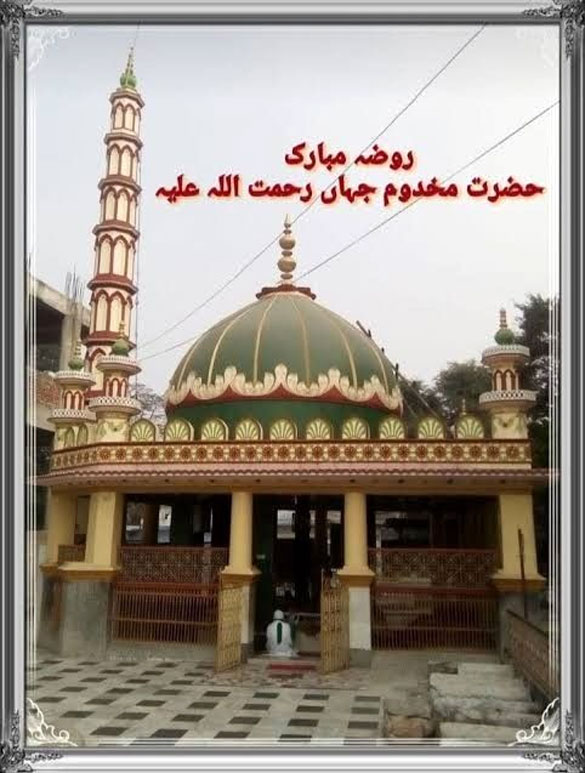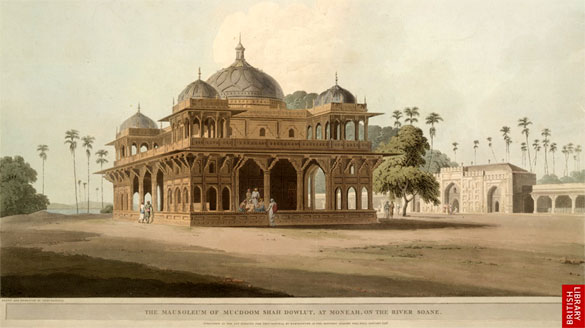Makhdoom Sharfuddin Ahmed bin Yahya Maneri: Spiritual Heads and Their Effects on the Idea of India

By
Arman Neyazi, New Age Islam
31 May 2021
Makhdoom
Sharfuddin Ahmed bin Yahya Maneri, Popularly Known As Makhdoom-ul-Mulk Bihari
and Makhdoom-e-Jahan Was A True Epitome Of Pluralism in Tasawwuf
Main
Points:
1. Muslim Sufis
of India are much revered all over the world for their teachings of humane
traits.
2. Indian
Muslim Sufis teachings and practices were directed to advocating a pluralistic
approach towards society.
3. Indian
social ethos is celebrated all over the world in the background of the works of
Indian Sufis.
4. Indian
social ethos of ‘unity in diversity is celebrated all over the world in the
background of the works of Indian Sufis.
-------
Muslim
Sufis of India are much revered all over the world for their teachings of
humane traits. People of conscience accept, study and practice their teachings
in their work of advocating a pluralistic approach towards society. Indian
social ethos of ‘unity in diversity is celebrated all over the world in the
background of the works of Indian Sufis.
India is a
country that boasts of Sufis and Rishi Muni in almost every of its state. Their
centuries-old teachings of compassion, equality and brotherhood reverberate in
nook and corner of the country in various national and regional languages.
Spiritual
masters are devoted to love. Sufi masters are spiritual masters who devote
their lives seeking the Creator’s compassion and forgiveness for the people and
the nation as a whole. They dedicate their lives to the welfare of society.
Many of them live such a penurious life that only people of vision understand
what they are. Kings and warriors visit their Dargah and or earthen cabins (कुटिया کٹیا) whatever be the
situation for their blessings and Ashirwad.

Dargah Hazrat Sharfuddin Ahmad Yahya
Maneri(رحمة
الله عليه )
----
Makhdoom
Sharfuddin Ahmed Yahya Maneri (رحمة الله عليه ) was one of those revered
Muslim Sufis who are followed by both Hindus and Muslims, alike. Hazrat Maneri
(RA) was a scholarly Sufi. He knew Arabic, Persian, logic, philosophy and along
with religion, he had mastered the soul of Tasawwuf (Sufism) through his self
created seclusion from the world during his 30 years of meditation in the
jungles of Bihar. To know his spiritual power, consider his following uplifting
quotations:
1. Sin is the key to misery.
2. The
existence of lover in the pavilion of the Beloved is a sin beyond comparison to
any other.
3. O
Brother! Sin for the servant is great calamity. May God protect us from such
things! Sin in the beginning hardens the heart, which ultimately leads to
unbelief and wretchedness. Don't forget the wiles of Satan and the fate of
Balāam Bāōur.
4.
Spiritual Guide should be perfect, well versed in the vicissitude of the
mystic path, and firmly established in his high state. He should be a man who
has experiences both the horror of God's Majesty and the delight of His beauty.
5.
Mystic way is infested with one's ego, devils, men and Jinn, thus making
it impossible to travel along it without and experienced, holy man as one's
escort. Also there are many slippery places where it is easy to fall. And one can
be plagued with misfortune and dangers from behind.
6. O
Brother! There are thousands upon thousands who have been martyred and slain on
the Divine way. Many other thousands are wounded and thrown prostrate. Those
well known for their intellect have been perplexed in their search for Him and
those famous for their religious knowledge are searching Him at the outskirts
of His Glory and Tremulousness. Those, whose eyes and radiant and heart
clairvoyant, are submerged in one drop of His ocean of His Majesty or singed
like sparks from the fire of His Glory.
7.
Bliss and misery are two treasures of the Lord. The key to the former is
submission, while the key to the latter is sin. The one who is fortunate has
been blessed from his mother's womb. Such a person is given the key to bliss.
The one who is unfortunate has been born accursed. Sin is the key to misery.
8. O
Dear! Live in this world broken-hearted and miserable. When Moses asked God:
"O Lord where should I search You?" The answer came: "In the heart
which is broken by the hand of destiny."
Courtesy: The Sayings and Teachings of the
Great Mystics of Islam, Gujranwala, Pakistan, 2004) (By Muhammad Riaz Qadiri)
Hazrat
Maneri (RA) has taught the world that Sufism is not a lesson to be learnt but
practised with the knowledge that Allah is All-Knower and the only ultimate
guide of the seekers of knowledge. It is ingrained in the soul and spirit of
the individual that gets enriched in the company of noble souls and holy books.
Sufism is a service, first to the spiritual teachers and then to the people.
Sufis are holy souls that are close to Allah, the Creator of this universe. The
closeness of Allah is subject to our service to His creation. Allah has
ingrained compassion, love and brotherhood in His creation therefore those who
abide by His commands are close to Him.
Yahya
Maneri (RA)’s Childhood and Education
Makhdoom
Sharfuddin Ahmed bin Yahya Maneri, popularly known as Makhdoom-ul-Mulk Bihari
and Makhdoom-e-Jahan was born to an illustrious father Makhdoom Kamaluddin
Yahya Maneri bin Israel bin Taj Faqeeh. His father was known as Sheikh Al-Hind. Yahya Maneri (RA)’s lineage
goes back to a place called Al-Khaleel. Al-Khaleel is connected to Prophet
Hazrat Ibrahim (AS) who is supposed to be resting there in his heavenly abode.
Al-Khalil is in Syria about 24 Kilometres from Jerusalem.
Yahya
Maneri (RA left his native place Maner near Patna in Bihar, India in search of
traditional knowledge of Arabic, Persian, logic, philosophy and religion at the
tender age of 12. He received his initial education at Narainganj, now in
Dhaka, Bangladesh for twenty-four years. He was imparted knowledge by a famous
scholar of his time, Ashraf-Uddin Abu Towama Bukhari.
After the
completion of his education at Narainganj, Yahya Maneri (RA) left for Delhi in
search of his spiritual education and training. At that time Delhi was known
for the most revered of all the Sufis there, Hazrat Nizamuddin Aulia (RA) along
with many other Sufis.
Hazrat
Maulana Syed Abul Hassan Ali Nadwi has dedicated on full chapter to Hazrat
Yahya Maneri (RA) in his famous book ‘Tareekh Dawat o Azeemat ‘ Vol II
(Saviours of Islamic Spirit Vol. II). Maulana Syed Abul Hassan Ali Nadwi writes
about Hazrat Yahya Maneri (RA)’s journey to Delhi and his being a disciple of
Hazrat Khwaja Najeebuddin Firdausi as under:
Ahmad
Sharfuddin came back disheartened from Delhi and Panipat. His elder brother
Shaikh Jalaluddin, however, suggested him to see Hazrat Khwaja Najeebuddin
Firdausi and told him about the distinctive features of his order. Ahmad
replied: ” The one who is the Pivot of spiritual perfection at Delhi ( meaning
Hazrat Khwaja Nizamuddin Auliya) sent me back with a tray of beetles. What
shall I gain by meeting others ?” but, on the insistence of his brother, he
made up his mind to betake himself to Delhi once more. As he related, later on,
he found himself in a flutter, and profusely perspiring when he got near Hazrat
Khwaja Najeebuddin Firdausi. He says that he had never had a similar experience
earlier on meeting any other mystic.
As soon as
Hazrat Khwaja Firdausi saw Ahmad, he said: ” Chewing beetles and carrying
beetle leaves in your handkerchief you come to see me, and still, you presume
yourself to be a spiritual guide! ” Ahmed emitted the beetle he was chewing and
sat down bewildered as if suddenly awakened to an unthought-of truth. After a
while, he requested Hazrat Khwaja Najeebuddin to accept him under his spiritual
preceptorship. The Khwaja graciously agreed to his request but sent him back
after taking the Ba’it from him.
Hazrat
Maneri (RA)’s Spiritual Journey
Born in
July 1263 A.D. (29 Sha'aban 661 A.H.) Sheikh Sharfuddin Ahmed bin Yahya Maneri
(RA) spent thirty years in meditation in the forests of Bihiya, about 24
kilometres and Rajgir, about 120 Kilometres from Maner. During his stay in the
jungle of Rajgir, he performed ascetic exercises in the hills that kept him
aloof from society. There is a spring of hot water in Rajgir that is named
after him as ‘Makhdoom Kund’. It is said that he used to pray at a nearby place
close to that spring.
After
spending 30 years of a secluded life away from the material comfort of the
world in quest of closeness to His creator, Sheikh Sharfuddin Ahmed bin Yahya
Maneri (RA) settled at Bihar Sharif, about 24 Kilometres west of Maner. At the
Khanqah at Bihar Sharif, he preached compassion, love, humanity and brotherhood
through his sermons and taught and trained his disciples in Sufism. His life
after that was dedicated to teaching and writing.
The
collections of the hundred letters he wrote to his disciple, Qazi Shamshuddin
in 747 Hijra, Maktoobat e Sadi (Hundred Letters Of Century) and Maktoobat e Do
Sadi (Two Hundred Letters Of Second Century) based on Islamic Theosophy are
literary genii on spiritual writing. Original manuscripts of his books on
Sufism, Rahat-ul-Qulub, Kanzul-Ma-Ani, Favaedat Rukni, Shara-e-Abadul راحت
القلوب، کنزول ما عینی ، فوائدت رکن، شارع عبادل) are counted as remarkable works of Tasawwuf are available in
the collection of Khuda Bakhsh Oriental Library at Patna, Bihar India.
He kept
writing and delivering sermons for up to 52 years from his Khanqah at Bihar
Sharif that was built by Sultan Muhammad Tughlaq, before he left for his
heavenly abode in January 1381 A.D.(6 Shawwal 782 Hijri).
Makhdoom
Sharfuddin Ahmed bin Yahya Maneri (RA), popularly known as Makhdoom-ul-Mulk
Bihari and Makhdoom-e-Jahan was a true epitome of his name ‘Makhdoom’, means
‘one who serves. He served humanity with all his might and ability, both
spiritual and physical. People over the world are still in contact with him
through his writings that are taken as a guiding light in the world of Tasawwuf
(Spiritualism).

Choti Dargah, Mausoleum of Makhdoom Shah Daulat, descendant of Makhdoom Yahya Maneri at Maner, 1780s painting
----
And
Allah knows the best.
----
Arman Neyazi is a columnist with NewAgeIslam.com.
URL: https://www.newageislam.com/islamic-personalities/khwaja-yahya-maneri-spiritual-idea-india/d/124907
New Age
Islam, Islam Online, Islamic Website, African Muslim News, Arab World News, South Asia News, Indian Muslim News, World Muslim News, Women in
Islam, Islamic Feminism, Arab Women, Women In
Arab, Islamophobia in America, Muslim Women
in West, Islam Women and Feminism
